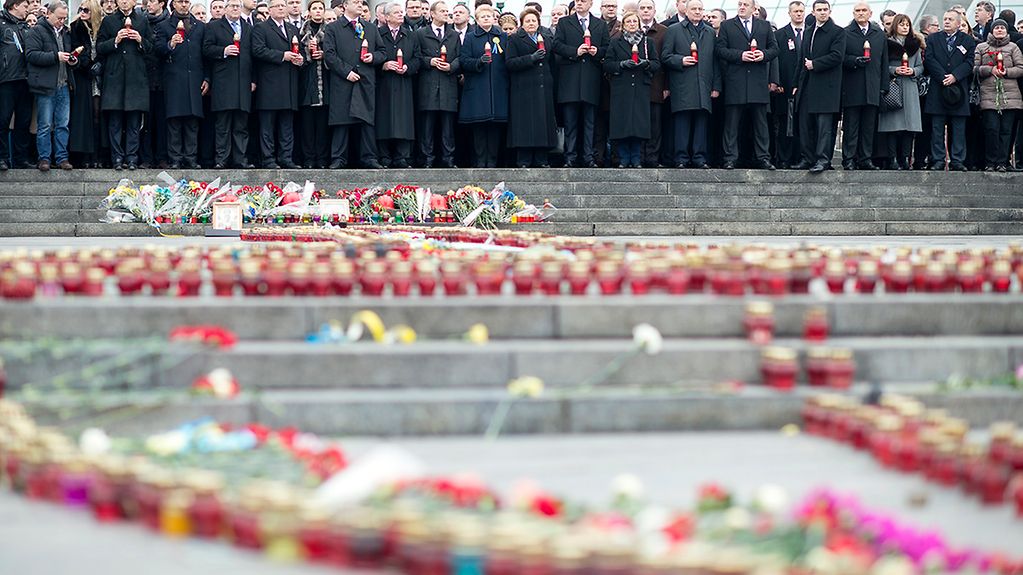Ukraine crisis
The ceasefire agreed for eastern Ukraine is still not being respected. Federal government spokesperson Steffen Seibert said Russia is still called on to use the influence it has over the separatists. He roundly condemned the fatal attack on a demonstration in Kharkiv.
4 min reading time

Solidarity with the Ukrainian democracy movement in Kyiv
Photo: Bundesregierung/Bergmann
On Monday, federal government spokesperson Steffen Seibert reported "significant exceptions" to the ceasefire in eastern Ukraine agreed in Minsk. "And that is a serious concern for us." On Friday in Paris, standing side by side with François Hollande, the Chancellor reiterated that it is worth every effort to try to prevent more bloodshed. And we will continue to make that effort, reaffirmed the spokesperson at the government press conference.
A mixed picture
If we look at the overall situation since the Minsk negotiations were concluded on 12 February, we must say that the implementation of what was agreed is unsatisfactory. Developments over the last few days have been positive in places, negative in others, said the government spokesperson.
Steffen Seibert considered it positive that an agreement had been reached on a plan for withdrawing heavy weapons, and that an exchange of prisoners had taken place on Saturday (21 February). "These are of course the first important steps in implementing the Minsk agreements," said the spokesperson. The crucial point is, however, achieving a full ceasefire.
Withdrawal of heavy weapons
In eastern Ukraine, separatists and government units exchanged prisoners on the front line on Saturday. At the weekend they also agreed on the withdrawal of heavy weapons from the front in the east of the country. This was to start on Sunday and be completed within two weeks.
Compliance with the ceasefire is the precondition for commencing withdrawal of heavy weapons, said Steffen Seibert. It is also the precondition for OSCE observers monitoring the procedure.
"In this context we would like to remind Russia of the serious commitments it made when it approved UN Security Council Resolution 2202 last week. We urge it to use the influence it has over the separatists," stated Steffen Seibert clearly.
On 12 February representatives of Ukraine, Russia and the pro-Russian separatists signed a package of measures in Minsk, the capital of Belarus. After protracted negotiations, agreement was reached on a ceasefire, the withdrawal of heavy weapons, the establishment of a buffer zone and an exchange of prisoners.
Federal Foreign Office spokesperson Martin Schäfer welcomed the fact that a substantial exchange of prisoners had taken place and that this agreement had been reached between the parties actively involved in the conflict regarding the withdrawal plan. That was point two of the Minsk agreements signed on 12 February. Now, he said, "The moment must be found when there is enough trust on both sides and a mutually verifiable procedure with the involvement of the OSCE so that these weapons are genuinely withdrawn."
Minsk still has a chance, says Federal Foreign Minister
Commenting on developments at the weekend, Federal Foreign Minister Frank-Walter Steinmeier said in a newspaper interview, "It is now important that the separatists end their military activities. It is up to Moscow to continue to exert pressure on the separatists to this end." And he added, "In spite of all difficulties, Minsk still has a chance as long as the parties to the conflict do not write it off."
A meeting of the ministers of foreign affairs of Germany, France, Russia and Ukraine has been called in Paris on Tuesday 24 February. The focus of these talks will be compliance with the ceasefire and withdrawing troops, as well as OSCE monitoring.
Attack on remembrance rally
With a "Dignity March" in Kyiv on Sunday, leading Ukrainian politicians commemorated the victims of shootings on the Maidan a year ago. Representatives of European institutions and friendly states attended as a sign of their solidarity with the Ukrainian democracy movement. Federal President Joachim Gauck also attended.
While the march in Kyiv was peaceful, a bomb exploded in the eastern Ukrainian town of Kharkiv on Sunday. At lest two people were killed and several more injured. Federal government spokesperson Steffen Seibert condemned the attack on peaceful demonstrators in the strongest possible terms, describing it as an attempt to bring unrest to a town "which is currently not yet in the grips of an atmosphere of this sort, to bring unrest and to divide".
During pro-western mass demonstrations against the then President Victor Yanukovych on the Maidan in Kyiv more than 100 people were killed. The precise circumstances surrounding their deaths have not yet been fully established.